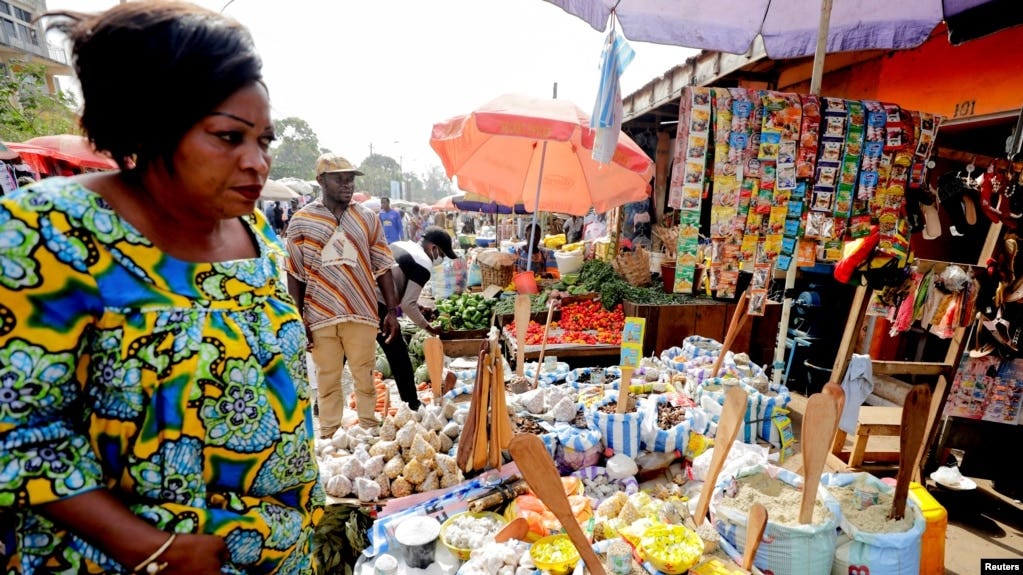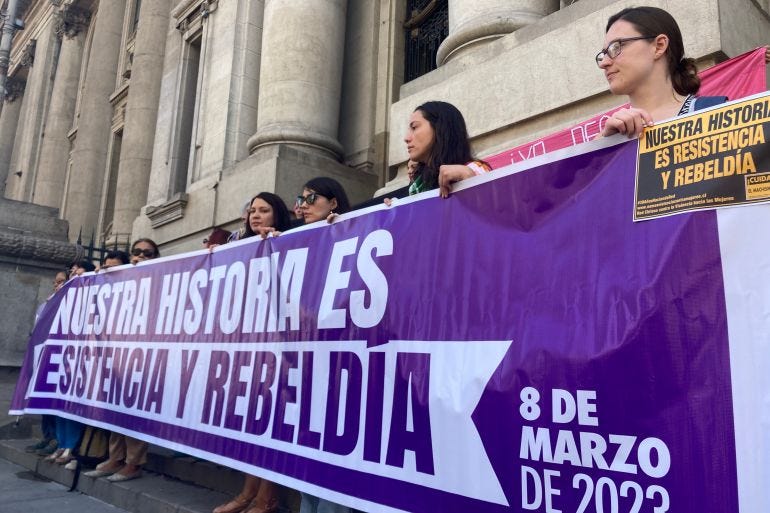Global Roundup: Cameroon Women Protest High Prices, Chile Abortion Rights, Trans Man on Period Taboo, Argentina Queer Tango, Artists Pay Tribute to Turkey, Syria Earthquake Victims
Curated by FG Contributor Samiha Hossain
A woman shops at the Mvog Ada market in Yaounde, Cameroon, Jan. 29, 2022. During a protest on March 8, 2023, women asked the government to help them cope with price increases.
Thousands of women in Cameroon took to the streets on International Women’s Day this year to protest the high cost of living. The women blew trumpets and whistles on the streets of the central African state's capital Yaounde, shouting and decrying the high cost of living amid surging inflation. They want the government to help them cope with price increases.
Suzanne Menanga is coordinator of the Cameroon Female Consumers Union that organized the protest. She says her group protested on International Women's Day because more than 80% of Cameroon's roughly 14 million women are either unemployed or earn very low wages that make it difficult to cope with the high costs. Menanga says food price inflation increased from 25% in 2022 to 40% in 2023, adding that it is difficult for families to purchase everyday items like bread, sugar, fish, salt, soap and vegetable oil, whose prices are up by between 18 and 45%.
The government says protests took place in several towns including Bamenda, Bafoussm, Ngaoudere and Ebolowa. Cameroon’s trade minister Luc Magloire Mbarga Atangana says Russia’s war in Ukraine has led to an increase in the prices of basic commodities all over the world. Atangana said civilians should learn to live with the price increases. However, the women say it is difficult for them to obey government instructions to stop overdependence on expensive imported rice, maize and beans because a 60% increase in prices for fertilizer is making it difficult to grow crops locally.
Chilean protesters hold a sign reading, 'Our history is resistance and rebellion' at a rally in favour of abortion rights in the capital Santiago on March 8, 2023 [Charis McGowan/Al Jazeera]
An estimated 400,000 women gathered to mark International Women’s Day in Chilean cities this week, with access to safe, free and legal abortion being one of the Chilean feminist movement’s key demands. Abortion is illegal in Chile, except in three limited circumstances: nonviable pregnancies, rape or risks to a mother’s life. A years-long push by rights advocates to loosen those restrictions suffered a serious blow last year when Chileans rejected a new draft constitution that would have enshrined reproductive health and bodily autonomy as fundamental rights.
Breaking the social stigma is urgent, that we create actions that lead to dialogue and conversations. The street belongs to us, and we will keep protesting. -Siomara Molina, spokeswoman for the Permanent Assembly for Abortion Legalisation
This year is especially significant in the fight for abortion rights in Chile, as 2023 marks 50 years since General Augusto Pinochet staged a bloody coup and seized power. During his 17-year rule, Pinochet forced conservative, Catholic values on the country, and in 1989, a year before his regime ended, he prohibited abortion in all circumstances.
Triggered by rising costs of living, Chile was rocked by months of unrest in 2019, when Pinochet’s enduring 1980 constitution was singled out as a root cause of a lack of social welfare and gaping inequality. The social mobilisations pressured politicians to grant a referendum to rewrite the constitution in 2020, which almost 80% percent of Chileans approved. The first draft of the new text was written by 154 popularly-elected representatives, who were largely independents representing social and environmental movements, including members of feminist groups. The highly progressive draft constitution set out to enshrine equality and a range of human rights, but 62% of voters rejected it in a 2022 general referendum.
Women in the country lost a huge opportunity. Maybe it wasn’t perfect, but it was a step in the right direction. -Antonia, 19-year-old student and protestor
Chile is currently in the process of drafting a second constitutional proposal. However, this time political parties are guiding the process and the result is expected to be more moderate, meaning reproductive rights could be left off the table.
There is a sense of hopelessness. The 2022 draft opened a door [for us] through representation. Now [the process] is happening behind closed doors. -Siomara Molina
Model Oscar McGregor via Pink News
As a queer trans man, London-based Oscar McGregor finds that narratives around menstruation can be “extremely dysmorphic.” He says that while the period industry is “moving in the right direction” and creating more products for gender-diverse people, there is still a way to go before trans men and non-binary people who bleed feel truly included.
It’s about time we progress the idea that periods are rooted exclusively in ‘womanhood’ so that we can include all genders in the conversation, and learn about the diversity of period experiences. -Oscar McGrego
The model recently partnered with absorbent apparel brand Modibodi on its new All Gender Collection, which includes the company’s first ever period briefs. McGregor believes the period industry can be a guiding force in creating wide change.
The more the industry does to speak openly about periods in the LGBTQIA+ communities, the more it will help to break down societal taboos and drive awareness around the need for menstrual inclusion for all bodies and all genders. -Oscar McGrego
McGregor notes that a lot of men’s toilets do not have bins to dispose of period products, which can make it “tricky” for trans men and people of other genders to use public toilets when they are on their period. Outside of brands, he also believes the conversation needs to start in school. He is optimistic that with time, these deep-rooted taboos will change for the better.
At the beginning, the proposal of queer milonga was disturbing in a largely macho world and gradually consolidated itself as a space of queer legitimization. (elDiarioAR)
The queer milonga (ballroom) was introduced in Argentina at the beginning of the 2000s to break the stereotypes set by the traditional, heteronormative tango. There are no assigned roles or patterns to follow – cabeceo (nodding) or guidance are not exclusively for men.
Queer tango is a space for embraces, tango and activism, all at the same time…the idea is that there are no assigned roles according to gender, anyone can decide to lead or to be led. The most interesting part is that everyone can enjoy playing both roles. -Liliana Furió, founder of La Furiosa Milonga in 2018
Liliana Furió began tango lessons in 2003 with writer Mariana Docampo, a pioneer of queer tango in Argentina. Furió is also an activist for Human Rights and co-founder of Historias Desobedientes, an association for daughters and sons of those responsible for the genocides of the last Argentinian military-civic dictatorship.
In 2001, when Argentina was going through a severe economic, political and social crisis, Docampo started her tango lessons for women. First she taught friends, then larger groups in rehearsal rooms before teaching classes.
It was a feminist lesbian place. It was supposed to be queer, but I gave classes only to women because that’s what the place allowed. Then in 2005, we opened Tango Queer in Simón En Su Laberinto, in the San Telmo neighborhood. -Mariana Docampo
In 2015, after the eruption of Ni Una Menos, with women and dissidents protesting in the streets, feminist tango took root in Argentina. New milongas emerged and new orchestras were formed, consisting of women, lesbians, trans and non-binary identities. In 2018, the Tango Feminist Movement (MFT) was created, a group of women was born with the fourth feminist wave and focused on preventing violence. One of the first actions taken was the adoption of a protocol against sexist violence, a guide to dealing with violence, harassment or discomfort in dance halls. Anahí Pérez Pavez, journalist and author of the book Tango y feminismo, considers that this is a new phase of the same movement that was the impetus for queer tango. Feminist tango now finds its expression in the public space; in the streets asking for legal, safe and free abortion; or at women’s meetings.
We as activists meet up with dancers, with female musicians and producers. The intergenerational barriers have broken down. We have converged. We have a feminist political declaration—taking the milonga to the streets and taking the streets to the milonga. We take the lead and learn from those who started it. -Anahí Pérez Pavez
Nilufar Moayeri paints a woman in light and darkness. (Rafe Arnott/CBC)
Artists in Metro Vancouver, Canada are honouring women and paying tribute to the victims of the devastating earthquakes in Turkey and Syria in an exhibit for International Women's Day and the centennial anniversary of the Turkish Republic. Nilufar Moayeri, an Iranian-born artist who grew up in Istanbul, is the art director of the exhibit titled Women's Art On Women's Day, organized by the Turkish-Canadian Society. Proceeds from the artists' paintings will go towards supporting survivors of the quake.
After that painful tragedy, we were all prepared to paint a woman to show how strong they are. -Nilufar Moayeri
Moayeri's painting shows a woman's face in light and darkness. The dark side shows damaged buildings and people trying to help others out of the rubble, while the light side, full of blues and yellows, represents hope, she says. Inanna Cusi, an Austrian-Mexican painter and filmmaker, will be showcasing a piece titled Gaia after the ancient Greek goddess of the Earth. It features the body of a woman carrying the planet. The body and the ground are full of cracks.
I tried to capture the strength of women and how we are holding together the world but also the doom … the earthquake destroying our world and the hardships that we're enduring at the same time. -Inanna Cus
Moayeri and others say it is essential to showcase "the power of women" through the paintings, especially as part of celebrations of the Turkish Republic's centenary and the collapse of the Ottoman Empire. In 1923, Turkey started efforts to modernize and secularize the country, which included passing equality legislation. Turkish women got the right to vote in 1934. For Moayeri, it is doubly important to create art that empowers women because of the feminist revolution that began in Iran in September 2022.
Samiha Hossain (she/her) is a student at the University of Ottawa. She has experience working with survivors of sexual violence in her community, as well as conducting research on gender-based violence. A lot of her time is spent learning about and critically engaging with intersectional feminism, transformative justice and disability justice.
Samiha firmly believes in the power of connecting with people and listening to their stories to create solidarity and heal as a community. She refuses to let anyone thwart her imagination when it comes to envisioning a radically different future full of care webs, nurturance and collective liberation.






